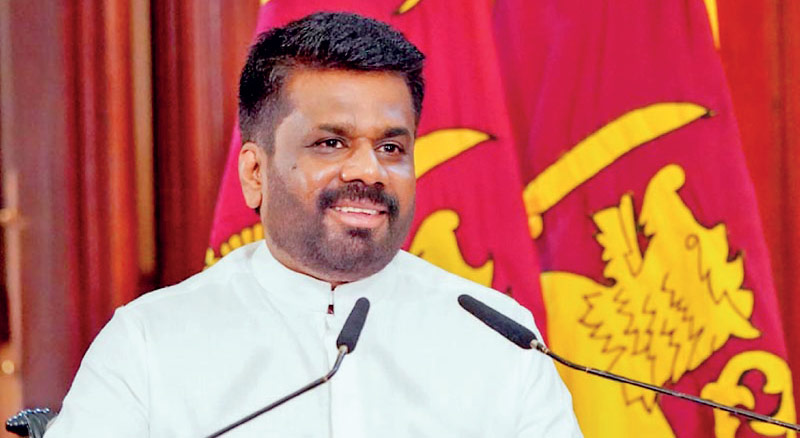Sunday Feb 15, 2026
Sunday Feb 15, 2026
Thursday, 31 July 2025 02:03 - - {{hitsCtrl.values.hits}}

The time for bold, inclusive leadership is now; leadership that understands that true transformation requires patience, preparation, and partnership with all stakeholders
 Corruption is not merely the result of individual moral failings but a symptom of systemic pressures. Many low and middle-income Sri Lankan families rely on informal facilitation payments or small bribes as economic survival mechanisms – an informal “parallel economy” born from inadequate wages and weak enforcement of fair labour standards. The informal payments sustain livelihoods in sectors where official compensation and service delivery are insufficient
Corruption is not merely the result of individual moral failings but a symptom of systemic pressures. Many low and middle-income Sri Lankan families rely on informal facilitation payments or small bribes as economic survival mechanisms – an informal “parallel economy” born from inadequate wages and weak enforcement of fair labour standards. The informal payments sustain livelihoods in sectors where official compensation and service delivery are insufficient
 Sri Lanka stands at a pivotal crossroads in its national development, a moment filled with promise, challenge, and profound opportunity. The Government’s intensified campaign against bribery and corruption is more than a policy shift; it signals a fundamental reimagining of how our society functions. Yet, as we applaud these bold initiatives, it is crucial to understand that corruption in Sri Lanka is deeply systemic, embedded within long-standing socio-economic structures. Addressing it requires thoughtful, well-planned action that targets the root causes rather than just symptoms.
Sri Lanka stands at a pivotal crossroads in its national development, a moment filled with promise, challenge, and profound opportunity. The Government’s intensified campaign against bribery and corruption is more than a policy shift; it signals a fundamental reimagining of how our society functions. Yet, as we applaud these bold initiatives, it is crucial to understand that corruption in Sri Lanka is deeply systemic, embedded within long-standing socio-economic structures. Addressing it requires thoughtful, well-planned action that targets the root causes rather than just symptoms.
The urgent and complex need for change
For decades, corruption has entrenched itself deeply within Sri Lanka’s institutions, eroding trust, stifling economic growth, and widening social inequality. Recent reforms, such as strengthening the Commission to Investigate Allegations of Bribery or Corruption (CIABOC), embracing digital-governance platforms, and enhancing transparency reflect a genuine commitment to accountability. The anticipated benefits are significant: reduced transaction costs, increased foreign investment, better governance, and improved public services.
International research confirms what we intuitively know; countries with lower corruption levels experience stronger economic growth and fairer distribution of wealth. For Sri Lanka, embracing a value-centric culture grounded in integrity is not only ethical but essential for sustainable prosperity.
Understanding the root causes: Why corruption persists in Sri Lanka
To effectively combat corruption, we must first understand its systemic origins. Several interconnected factors have created an environment where corrupt practices flourish:
Lack of transparency in governance
The absence of transparent decision-making processes in Government institutions has created opportunities for corrupt practices. Without clear visibility into how policies are formulated, contracts awarded, and resources allocated, accountability becomes nearly impossible to maintain.
Poor enforcement of law
Weak enforcement mechanisms have created a culture of impunity where corrupt practices are rarely prosecuted effectively. When laws exist but are not consistently enforced, they lose their deterrent effect, encouraging further violations.
Inadequate public sector compensation
The low salary structure in the public sector has created economic pressures that drive many civil servants toward corrupt practices as a means of survival. When official compensation fails to meet basic living standards, informal income supplementation becomes attractive.
Insufficient accountability and oversight
The absence of robust oversight mechanisms has allowed corrupt practices to operate unchecked. Without effective monitoring systems and independent oversight bodies with real authority, corruption can flourish in the shadows.
Concentration of power without checks and balances
The 1978 Constitution concentrated significant power in the executive branch without establishing adequate checks and balances. This concentration of authority, combined with weak institutional safeguards, has created opportunities for abuse of power and corrupt practices.
Nepotism and patronage systems
The prevalence of nepotism and political patronage has undermined merit-based systems, creating networks of obligation and favours that facilitate corrupt practices. When positions and opportunities are distributed based on connections rather than qualifications, corruption become institutionalised.
Complex bureaucratic practices
Overly complex and opaque bureaucratic procedures have created multiple opportunities for rent-seeking behaviour. When simple processes require numerous approvals and lengthy procedures, citizens are often willing to pay bribes to expedite services.
Economic liberalisation and its unintended consequences
The rapid economic liberalisation policies, while intended to boost growth, inadvertently created new avenues for corruption. The sudden shift from a controlled economy to market-based systems, without adequate regulatory frameworks and institutional capacity, created opportunities for rent-seeking behaviour. Privatisation processes, deregulation of industries, and opening of markets, when implemented without proper oversight and transparency mechanisms, enabled corrupt practices in contract awards, licensing, and regulatory capture.
Learning from history: The perils of abrupt policy implementation
Sri Lanka’s modern history teaches us critical lessons about the importance of careful, gradual policy implementation. The overnight fertiliser ban of 2021 serves as a stark reminder of how well-intentioned policies can have catastrophic consequences when implemented without adequate preparation, stakeholder consultation, or support systems. This experience underscores the need for comprehensive change management in any anti-corruption initiative.
The systemic challenge: Addressing economic dependencies
Corruption is not merely the result of individual moral failings but a symptom of systemic pressures. Many low and middle-income Sri Lankan families rely on informal facilitation payments or small bribes as economic survival mechanisms – an informal “parallel economy” born from inadequate wages and weak enforcement of fair labour standards. The informal payments sustain livelihoods in sectors where official compensation and service delivery are insufficient.
This reality must not be misconstrued as condoning corruption; rather, it highlights that anti-corruption efforts must go beyond punitive enforcement and address underlying economic dependencies that perpetuate corrupt practices. Abrupt crackdowns without accompanying social support risk plunging vulnerable populations deeper into poverty and social unrest, undermining the very stability these reforms seek to build.
The Singapore model: A global success story rooted in balanced reform
Singapore’s rise from a corruption-ridden city-state in the 1960s to a global economic powerhouse offers vital lessons. The government combined strict enforcement of anti-corruption laws with:
Importantly, Singapore’s reforms were implemented through systematic, phased processes involving extensive stakeholder consultation and institutional strengthening, thus minimising disruption and building broad-based buy-in.
A holistic strategy for Sri Lanka’s transformation
To effectively uproot corruption and build a value-centric society, Sri Lanka must adopt a comprehensive, inclusive approach that includes:
1.Constitutional and legal reforms
Addressing the concentration of power by strengthening checks and balances, enhancing the independence of oversight institutions, and creating robust transparency requirements for Government operations.
2.Institutional strengthening
Building capacity in anti-corruption agencies, establishing independent oversight bodies with real authority, and creating transparent decision-making processes across all levels of government.
3.Public sector reform
Implementing competitive salary structures for public servants, establishing merit-based recruitment, annual salary revision and promotion systems, and simplifying bureaucratic procedures to reduce opportunities for rent-seeking.
4.Graduated implementation with support systems
Instead of sudden crackdowns, reforms should be phased in alongside parallel support measures—such as financial aid, skill development, and alternative livelihood options to ease the transition for affected families.
5.Investing in human capital development
Expanding education, vocational training, and entrepreneurship will create genuine opportunities, reducing reliance on corrupt income while building a skilled workforce that can support a value-driven economy.
6.Enhanced transparency and accountability
Implementing comprehensive transparency measures, including public disclosure requirements, open procurement processes, and accessible information systems that enable citizen oversight. The current digitalisation program should significantly address these requirements.
7.Community and stakeholder engagement
Collaborating with local communities, professional associations, and civil society to design context-sensitive solutions that foster ownership and trust. Empowering citizens through protected whistle-blowing mechanisms to report corruption safely.
8.Building transformative, not punitive, systems
Recognising that most involved in corruption respond to systemic pressures, not inherent dishonesty allows for empathetic, transformative interventions rather than purely punitive measures. While strict enforcement is necessary, balanced approaches that combine accountability with capacity building foster sustainable change.
9.Leveraging private sector leadership
The private sector plays a crucial dual role as both a key stakeholder responsible for eliminating bribery and a partner in driving reform. Businesses must commit to transparent procurement, fair wages, and strong compliance frameworks.
Measuring true success: Beyond convictions to sustainable prosperity
Success should not be measured solely by the number of prosecutions but by meaningful improvements in people’s lives, such as higher living standards, reduced income inequality, stronger social cohesion, and increased trust in institutions. A truly value-centric Sri Lanka will be one where inequality shrinks, social cohesion strengthens, prosperity is shared, and integrity guides governance.
The road ahead: Choosing wisdom over expediency
Building a value-centric Sri Lanka is a complex and challenging journey, but one filled with hope. We stand at a crucial juncture, facing a choice between rapid interventions and long-term, systemic reforms. While quick measures may offer immediate results, they sometimes risk unintended effects. More holistic transformations that tackle root causes and build lasting alternatives through careful change management promise enduring success without the social disruption that can accompany abrupt policy shifts.
Our vision is clear; a prosperous, equitable Sri Lanka where every citizen thrives through integrity and legitimate means, and where essential services function effectively within an ethical framework. This vision is within reach, but only if we commit to a comprehensive, compassionate approach that honours both the urgency of reform and the wisdom of gradual, well-managed change.
The time for bold, inclusive leadership is now; leadership that understands that true transformation requires patience, preparation, and partnership with all stakeholders. Together, we can build a Sri Lanka that stands as a beacon of integrity and opportunity for generations to come, avoiding the costly mistakes of our past.
(The writer is a Chartered HR professional and Past President of the Chartered Institute of Personnel Management (CIPM) Sri Lanka. He brings extensive experience in organisational transformation and human capital development to his analysis of national development challenges. The views expressed in this article represent the author’s personal perspectives and do not necessarily reflect the official position of any organisation.)